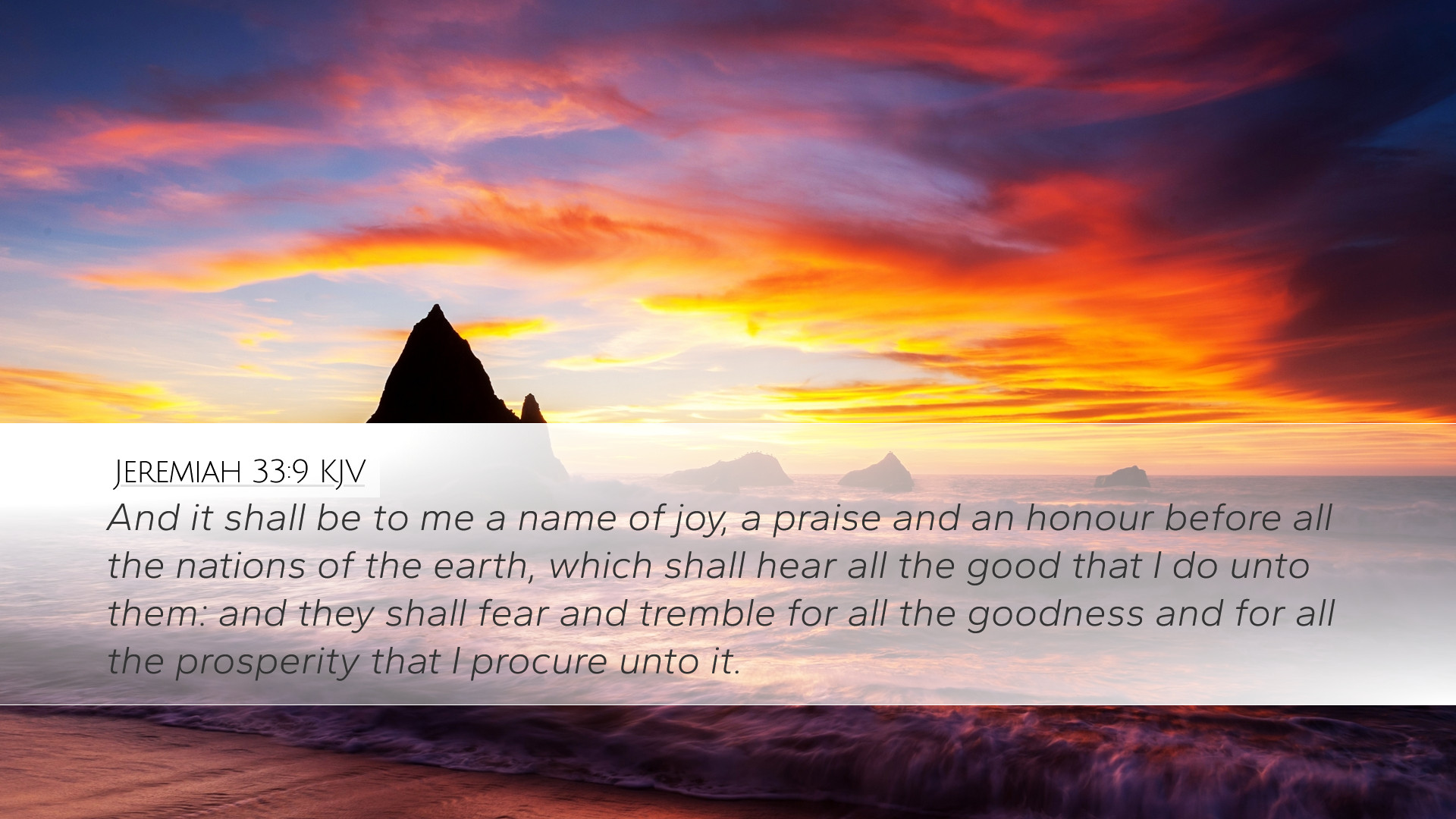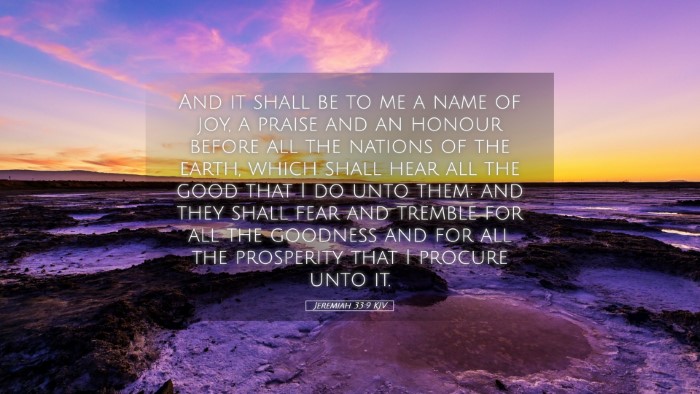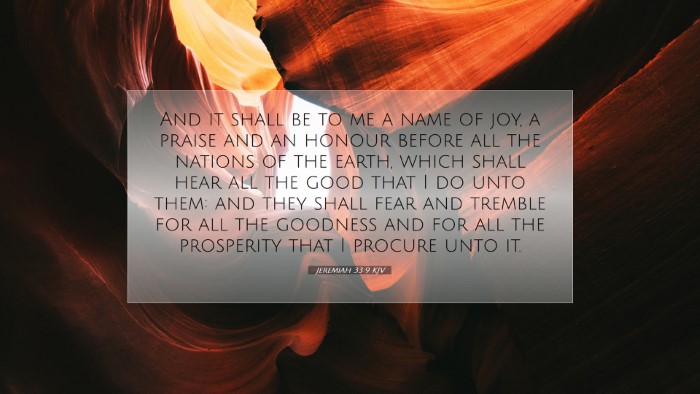Commentary on Jeremiah 33:9
Jeremiah 33:9 (NIV): "Then this city will bring me renown, joy, praise, and honor before all nations on earth that hear of all the good things I do for it; and they will be in awe of this city that I have adorned."
Introduction
Jeremiah 33:9 presents a profound promise concerning Jerusalem and its future restoration. The verse encapsulates the themes of divine glory and the beneficial impact of God’s plans on His people and their surroundings. In this commentary, we will draw upon insights from renowned public domain commentators to explore the multifaceted significance of this verse in relation to its historical context, theological implications, and its application for modern readers.
Historical Context
The Book of Jeremiah was written during a tumultuous period in Judah's history, around the time leading to the Babylonian exile. Jeremiah's prophetic messages were significantly influenced by the political instability, moral decay, and spiritual apostasy that characterized his nation. Through this verse, we observe a shift toward hope and restoration amidst impending doom.
Divine Promise of Restoration
According to Matthew Henry, this verse reveals God's commitment to redeem His people. The phrase "this city" refers specifically to Jerusalem, which had become synonymous with the people of Israel's identity. Henry emphasizes that despite the dire circumstances, God promises that Jerusalem will be renewed and exalted.
Albert Barnes reinforces this view by noting that the “good things” mentioned pertain to the blessings that God will unleash upon the city once it is restored. This highlights the nature of God's dealings with His people—they are often accompanied by tangible benefits that attract the attention and admiration of others. The passage speaks to the transformative power of divine intervention.
Furthermore, Adam Clarke adds that the term "renown" indicates a reinstatement of Jerusalem’s reputation as a center of divine worship and blessing. When people see the turnaround in the city’s fortunes, they will marvel at what God has done.
Theological Implications
Theologically, Jeremiah 33:9 underlines God's sovereignty and faithfulness. It serves as a reminder that even in times of judgement, God retains the ultimate authority over redemption. Matthew Henry articulates that God’s plans are not solely for Israel but have an encompassing nature that impacts the nations.
This perspective aligns with Albert Barnes, who describes the global implications of Jerusalem's restoration as being a testament to God's character. The phrase "all nations" indicates that the response to God's greatness in restoring His city will reverberate well beyond its borders.
Moreover, contemporary scholars glean from this text that it sets a precedent for understanding how God’s blessing upon a people can have repercussions that extend to broader contexts, invoking a sense of awe and reverence among onlookers.
The City As a Symbol of God’s Glory
In Jeremiah’s depiction, the city of Jerusalem emerges as a symbol of hope and divine glory. Matthew Henry refers to this metaphorically as the “beauty” of God’s creation. This perspective encourages believers to view their communities as potential reflections of God's glory when they live righteously and obey God's commandments.
Adam Clarke elaborates on the concept of honor and praise as intrinsic rewards that come from a life that is faithful to God's commands. Clarke notes that the drawn attention towards Jerusalem would not merely stem from its physical beauty, but rather from the profound spiritual blessings it embodies—a community redeemed and transformed by divine grace.
Application for Today
The message of Jeremiah 33:9 extends its relevance to modern readers, particularly pastors and theologians. In a world rife with conflict and skepticism, the call for restoration and hope is poignant. Albert Barnes encourages modern believers to remain steadfast in the belief that God can effect change in their lives and communities, similar to the transformation of Jerusalem.
This passage challenges spiritual leaders to consider how they can promote activities that lead to societal transformation, acknowledging that when a community embodies God's principles, it attracts recognition and reverence from others. Matthew Henry urges the faithful to participate actively in God’s redemptive mission, turning their sights toward how their cities can reflect the glory of God just as Jerusalem was promised to do.
Conclusion
In summary, Jeremiah 33:9 is not merely a historical promise for a particular city but a profound reminder of God's power to restore and bless. As we reflect on its implications, we are called to embrace the duality of judgment and grace present in God's dealings with His people. This verse serves as a beacon of hope, encouraging all who believe to trust in God's transformative work, not only in their lives but also within their communities.
As Matthew Henry, Albert Barnes, and Adam Clarke suggest, the message encapsulated in Jeremiah 33:9 beckons believers toward an active engagement in glorifying God through their lives, bearing witness to His goodness and power in the world.


